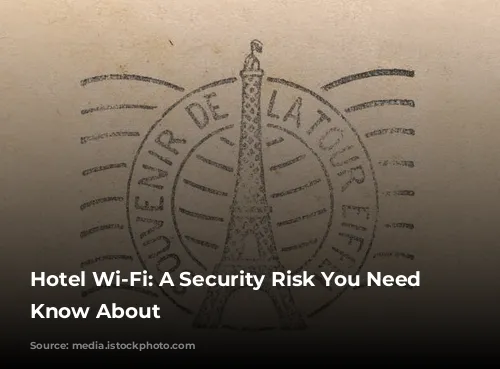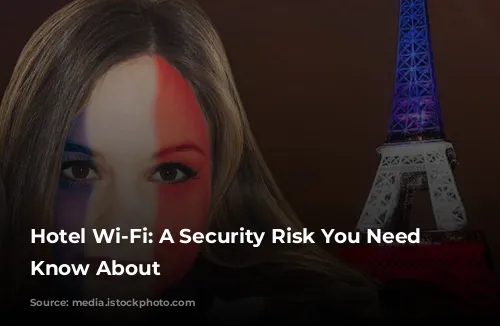Think of hotel Wi-Fi like any other Wi-Fi network – its security depends on how well its owners protect it. Unfortunately, many hotels fall short, leaving their networks vulnerable to cyberattacks. Hackers often target hotel Wi-Fi because travelers are more likely to be relaxed and less cautious about security when they’re on vacation.

Why Hotel Wi-Fi is So Vulnerable
There are several reasons why hotel Wi-Fi poses a significant security risk.
- Weak Encryption: Many hotels don’t use strong encryption to protect your data. This means that anyone with the right tools can easily eavesdrop on your online activities. Even though WPA3 is the most secure encryption standard available, some hotels still use outdated methods, making their guests easy targets.
- Outdated Equipment: Some hotels rely on outdated hardware, like routers that haven’t been updated in years. This means they can’t benefit from the latest security updates, making them more vulnerable to attacks.
- Phishing Networks: Attackers can create fake Wi-Fi networks that look identical to the hotel’s real network. They then use the same password, so unsuspecting guests connect without realizing they’re actually connecting to a malicious network. This allows the attacker to steal your data and compromise your devices.

The Consequences of Insecure Hotel Wi-Fi
If you connect to an insecure hotel Wi-Fi network, you risk:
- Data Theft: Hackers can steal your login credentials, lock you out of your accounts, and demand a ransom. They can also steal your financial information and make unauthorized purchases.
- Malware Infections: Your device can become infected with malicious software that can steal your data, spy on your activities, or be used for further attacks.
- Reputation Loss: If you access business accounts on insecure Wi-Fi, you could compromise your company’s data and your reputation.

Protecting Yourself on Hotel Wi-Fi
Here are some steps you can take to stay safe when using hotel Wi-Fi:
- Use a VPN: This is the most effective way to protect your data on public Wi-Fi. A VPN encrypts your internet traffic, making it impossible for hackers to intercept your data.
- Enable Your Firewall: Most operating systems have a built-in firewall that can help protect your device from malicious traffic. Make sure your firewall is turned on before connecting to any public network.
- Avoid Sensitive Transactions: Only make financial transactions or access sensitive accounts when using a secure, private network.
- Strong Passwords and Multi-Factor Authentication: Use strong passwords for all your accounts and enable multi-factor authentication whenever possible.
- Use Security Software: Consider using additional security software, like NordVPN’s Threat Protection Pro, to help you avoid malicious websites and malware.
- Double-Check the Network: Always verify that you’re connecting to the correct Wi-Fi network. If you’re unsure, ask the hotel staff for confirmation.
- Consider Mobile Data: If you need to access sensitive accounts, consider using your mobile data instead. This is usually a safer option than using unsecured public Wi-Fi.
Is Hotel Wi-Fi Safe for Banking?
No, it’s not safe to bank on hotel Wi-Fi unless you’re using a reliable VPN to encrypt your data. If you connect to an unsecured network, anyone can monitor your online activities and steal your sensitive information.
Even though hotels may not be actively trying to spy on their guests, their network administrators can still see some information about your browsing activity, like the websites you visit and how much time you spend on each site.
How a VPN Protects Your Data
A VPN creates an encrypted tunnel between your device and a remote server, making it difficult for hackers to intercept your data. When you use a VPN, your online activity is routed through the VPN server, so your real IP address is hidden. This makes it much harder for attackers to track your location or steal your data.
The Benefits of a VPN for Travelers
While it might seem like an extra expense, a VPN can be a valuable investment for travelers.
- Protect All Your Devices: Many VPNs allow you to connect multiple devices with one account.
- Save Money: Some VPNs can help you find cheaper flight tickets.
- Internet Freedom: A VPN can help you bypass internet censorship and access restricted content.
- Block Trackers and Ads: Many VPNs have built-in ad blockers and tracker blockers.
- Change Your Virtual Location: You can easily change your IP address to a different location, which can be useful for accessing geo-restricted content or bypassing censorship.
- Secure Public Wi-Fi: A VPN is essential for protecting your data when using public Wi-Fi networks.
So until hotels improve their Wi-Fi security, a VPN is your best bet for staying safe while traveling.
This article provides a comprehensive overview of the security risks associated with hotel Wi-Fi and offers practical tips on how to protect yourself. It emphasizes the importance of using a VPN and highlights the various benefits a VPN can offer travelers.
